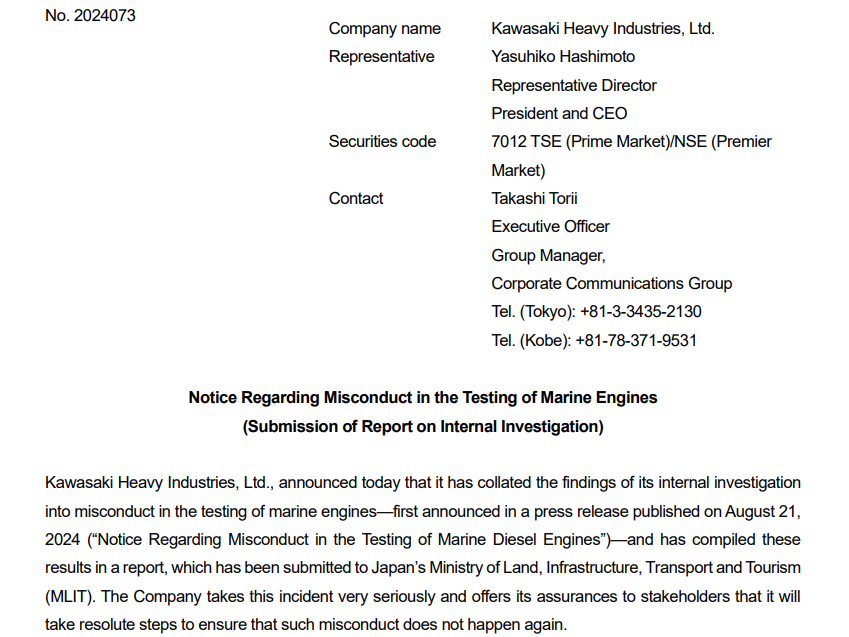Kawasaki Heavy Industries, Ltd., announced on December 25 that it has collated the findings of its internal investigation into misconduct in the testing of marine engines—first announced in a press release published on August 21, 2024 (“Notice Regarding Misconduct in the Testing of Marine Diesel Engines”)—and has compiled these results in a report, which has been submitted to Japan’s Ministry of Land, Infrastructure, Transport and Tourism (MLIT). The Company takes this incident very seriously and offers its assurances to stakeholders that it will take resolute steps to ensure that such misconduct does not happen again.

In addition to the information contained in the interim report submitted to the MLIT on September 27, 2024, the report includes information on the impact of this misconduct on compliance with regulations governing NOx emissions and CO2 emissions, namely, the energy efficiency design index (EEDI) and the energy efficiency existing ship index (EEXI), based on the Company’s ongoing internal investigations, and an analysis of the root causes of this misconduct, as well as an outline of the actions the Company is taking to prevent recurrence.
On September 13, the MLIT completed an on-site inspection subsequent to the rectification of testing equipment, and shop trials commenced thereafter. On November 11, the Company obtained Engine International Air Pollution Prevention (EIAPP) certificates and shipments gradually resumed.
The Company is currently examining whether this matter will impact its financial results and will immediately issue notification should such an impact be confirmed.
The Company inspected 674 marine engines subject to NOx emissions regulations for marine vessels, manufactured by the Energy Solution & Marine Engineering Company (an internal company), which were installed on vessels constructed after January 1, 2000.
After confirming shop trial records and interviewing pertinent parties, it was ascertained that data had been altered for 673 two-stroke marine engines, out of a total of 674 marine engines inspected, and that misconduct in testing during shop trials was to satisfy the required customer specifications or compensate for the accuracy levels of testing equipment. Misconduct fell into one or more of five categories, as indicated below, with data including results from the investigation subsequent to the interim report of September 27, 2024.

Recalculations using specific prototype engines (parent engines), for which records regarding the alteration of fuel consumption rate test data existed, confirmed that the number of engines for which compliance with NOx emissions regulations were impacted was as indicated below.

A: No alteration of data was found and actual measured values did not deviate from NOx emissions regulation values.
B: Alteration of data was found, but actual measured values did not deviate from NOx emissions regulation values.
C: Alteration of data was found and actual measured values deviated from NOx emissions regulation values.
D: Further investigation is required, owing to difficulties in confirming actual measured values.
In addition, because fuel consumption rates used in NOx emissions verification tests are also used for calculations to determine compliance with CO2 emission regulations, namely, EEDI and EEXI, after verifying NOx emissions regulations, the Company continued to probe the impact of the unauthorized alteration of test data, adjustment of amplifiers for water brake torque indicators subsequent to calibration and unauthorized operation on compliance with CO2 emissions regulations, which confirmed the appropriateness of water brake torque indicators. Accordingly, trial EEDI calculations were performed in cooperation with classification societies, shipyards and other relevant organizations. Calculations for all 139 engines that may be subject to EEDI (of which five were installed in Japan-registered vessels) revealed a low likelihood of exceeding these regulations.
The Special Investigative Committee for Marine Engines created to probe this specific incident, which comprises neutral third-party experts, continues to examine the details and will advise the Company going forward regarding its analysis of causes and recommended measures for preventing recurrence. Taking into account causes cited by this committee, as well its recommendations for measures to ensure such misconduct does not happen again, the Company will take decisive steps to prevent recurrence along with the above actions.
Cognizant of the gravity of this and other recently identified incidents of misconduct, the Company has established the Special Compliance Promotion Committee, which is chaired by Representative Director, President and CEO Yasuhiko Hashimoto. This committee is working diligently not only to clarify and eradicate the problems that led to these specific incidents, but also to prevent recurrence by scrupulously reforming the Company Group’s compliance and governance framework through the building of systems that prevent misconduct, strengthening of detection capabilities and reform of its corporate culture.


